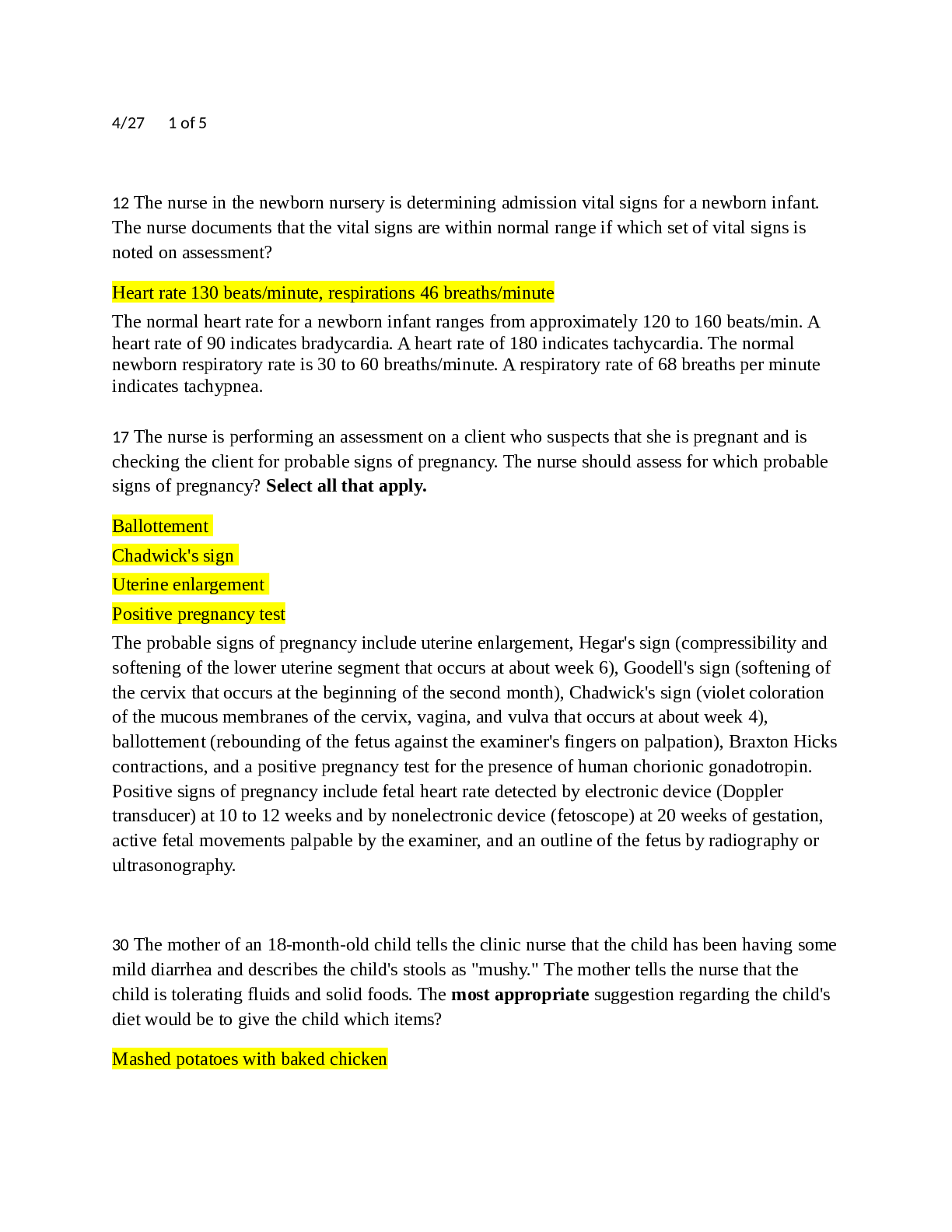12 The nurse in the newborn nursery is determining admission vital signs for a newborn infant.
The nurse documents that the vital signs are within normal range if which set of vital signs is
noted on assessment?
Heart rate 130 beats/minute, respirations 46 breaths/minute
The normal heart rate for a newborn infant ranges from approximately 120 to 160 beats/min. A
heart rate of 90 indicates bradycardia. A heart rate of 180 indicates tachycardia. The normal
newborn respiratory rate is 30 to 60 breaths/minute. A respiratory rate of 68 breaths per minute
indicates tachypnea.
17 The nurse is performing an assessment on a client who suspects that she is pregnant and is
checking the client for probable signs of pregnancy. The nurse should assess for which probable
signs of pregnancy? Select all that apply.
Ballottement
Chadwick's sign
Uterine enlargement
Positive pregnancy test
The probable signs of pregnancy include uterine enlargement, Hegar's sign (compressibility and
softening of the lower uterine segment that occurs at about week 6), Goodell's sign (softening of
the cervix that occurs at the beginning of the second month), Chadwick's sign (violet coloration
of the mucous membranes of the cervix, vagina, and vulva that occurs at about week 4),
ballottement (rebounding of the fetus against the examiner's fingers on palpation), Braxton Hicks
contractions, and a positive pregnancy test for the presence of human chorionic gonadotropin.
Positive signs of pregnancy include fetal heart rate detected by electronic device (Doppler
transducer) at 10 to 12 weeks and by nonelectronic device (fetoscope) at 20 weeks of gestation,
active fetal movements palpable by the examiner, and an outline of the fetus by radiography or
ultrasonography.
30 The mother of an 18-month-old child tells the clinic nurse that the child has been having some
mild diarrhea and describes the child's stools as "mushy." The mother tells the nurse that the
child is tolerating fluids and solid foods. The most appropriate suggestion regarding the child's
diet would be to give the child which items?
Mashed potatoes with baked chicken
The continued feeding of a normal diet can prevent dehydration, reduce stool frequency and
volume, and hasten recovery. Common foods that are especially well tolerated during diarrhea
are bland but nutritional foods, including complex carbohydrates (rice, wheat, potatoes, cereals),
yogurt containing live cultures, cooked vegetables, and lean meats. The foods in options 1 and 3
may worsen the diarrhea. Fluids only will affect nutritional status.
41 Which is considered a normal finding in a newborn less than 12 hours old?
Has not passed meconium yet
Meconium is the name for the first greenish black, tarry stools that the newborn will pass. It is
possible that meconium may not be passed for as long as 24 to 48 hours. The WBC count is
excessive for a newborn.The total serum bilirubin level is also excessive in the first 24 hours of
life. Seesaw respirations indicate a respiratory problem.
Read More

